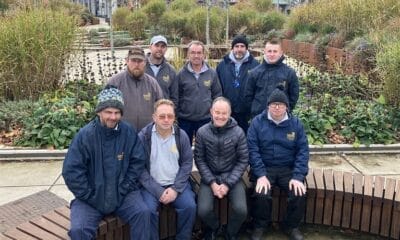
The creation of a green oasis in the heart of the city on the site of two former Coventry University buildings has been recognised with two major sustainability awards.
The Green Gown Award, in the category of Nature Positive, and the Green Flag Award for Best Climate Adaption, were both won earlier this month.
Coventry University demolished the Alan Berry and James Starley buildings to make way for the Peace Garden opposite Coventry Cathedral and Starley Gardens on Cox Street, transforming the spine of the campus into a green space for people and wildlife to co-exist.
The Green Flag prize is considered a ‘best of the best’ accolade as only projects to have won prestigious Green Flag Awards earlier in the year are open for consideration. It not only recognises the creation of a vibrant green space but also its impact in the fight against climate change.
The Green Gown Awards recognise exceptional sustainability initiatives being undertaken by universities and colleges across the UK and Ireland.
Jamie Whitehouse, Grounds and Public Realm Manager at Coventry University said, “These are major awards for the university, as they demonstrate our commitment to creating a sustainable campus that transforms the grey to the green, which is welcoming to people and wildlife.
“The awards recognise the hard work of the university Grounds team and the wider Estates team in creating an exciting, relaxing, and stimulating external environment in which to live, study or work.”
The gardens include wildflower meadows, biodiverse-friendly planting, tree planting, informal social spaces, and a prominent sculpture by local artist George Wagstaffe.
The new greenspace on the former Alan Berry site provides new stunning views of the iconic Coventry Cathedral and interconnects from either side to an edible garden, which is open to all to harvest the fruit and vegetables, as well as providing nesting and food for pollinators such as bees, flies, and butterflies. Overall, it contributes to the university’s vision to create pollinator hubs and corridors.
The Environmental and Grounds Team works in collaboration with academic departments, such as the Centre of Agroecology, Water and Resilience (CAWR), and Warwickshire Wildlife Trust to deliver events like bee walks and hedgehog talks for the campus community.
Professor John Latham, CBE, Vice-Chancellor of Coventry University Group, said: “Winning these awards is a major achievement for the Group and a validation of our commitment to building a greener, more sustainable campus.
“It underpins our ongoing dedication to working with local and global collaborators to tackle global sustainability challenges, address climate change, and create better futures for our communities.”
Coventry University is working hard to become net zero by 2030, a target being supported by a grant of almost £13million from the Department for Energy Security’s Public Sector Decarbonisation Scheme.
The environmental benefits of this transformation are far-reaching:
- Reduced carbon emissions – the demolition of the buildings has eliminated significant energy consumption and associated carbon emissions.
- Improved air quality – the new green spaces and gardens help to absorb pollutants and improve air quality.
- Reduced urban heat island effect – the green spaces and gardens help to cool the surrounding area of the university
- Enhanced biodiversity – the project has created new habitats for wildlife and increased biodiversity.
- Sustainable drainage – the green spaces help to manage rainwater runoff and reduce the risk of flooding.
The project has won several other awards, including the DEFRA Bees’ Needs Champions Award 2023 and Bronze and Silver Hedgehog Friendly Campus Awards, and has played host to several events for Warwickshire Wildlife Trust.
The money will help towards the cost of installing around 1,300 new solar panels and connecting nine Coventry University buildings to the city’s district energy network.







:focal(1171x270:1173x268)/origin-imgresizer.eurosport.com/2024/12/01/4068115-82499948-2560-1440.jpg?w=150&resize=150,150&ssl=1)






